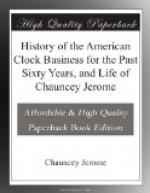I knew Mrs. Thomas well when I was a boy, fourteen years old. She is one of the best of women, and is now the widow of one of the richest men in the state. The families of Terry and Thomas are extensively known, throughout the United States. Mr. Thomas died two years ago at the age of seventy-five. He was born in West Haven, about four miles from New Haven, and learned the joiners’ trade in Wolcott, and worked in that region and in Plymouth five or six years, building houses and barns. I waited on him when he built a barn in Plymouth, carrying boards and shingles. He soon after went into the clock business in which he remained during life. Mr. Terry died in 1853, at the advanced age of eighty-one.
CHAPTER VI.
OPERATIONS OF FRANK MERRILLS—A SAD HISTORY.—BUSINESS TROUBLES, ETC.
In the fall, of the year 1840, a young man by the name of Franklin Merrills was introduced to me as one the smartest and likeliest business men in the whole country. It was said that he could trade in horses, cattle, sheep, wool, flour, or any thing else, and make money. He belonged to one of the first families in Litchfield county. I thought by his appearance and recommendations that he would be a good customer for me and I sold him a thousand dollars worth of clocks to begin with. He gave me his four months’ note which was promptly paid when due. He hired three pedlars and went with them into Dutchess county New York, where they sold the clocks very fast. The one-day O.G. brass clock was a new thing to them, first-rate for time, and they readily went off for fifteen and twenty dollars apiece. I sold them to him for six dollars apiece, and it appeared, at this rate, that he could make a fortune in a few years. His credit became established for any amount, and he soon began to want clocks about twice as fast as at first. A man by the name of Bates transported them for him in a large two-horse wagon from my place to Washington Hollow, about twelve miles east of Poughkeepsie. Mr. Bates lived in the same neighborhood where Frank was brought up in New Hartford, Conn. Every week or two he would go out with a load. Things moved on in this seemingly prosperous way for some time. One day I accidentally heard that parties in New York with whom I had never dealt, were selling my clocks at very reduced prices, and I began to mistrust that Frank had been selling to them at less than cost. On seeing him, he told me I was greatly mistaken and smoothed down the matter so that it appeared satisfactory to me. He had at this time got into debt about eighteen thousand dollars. One day he went to Hartford and bought seven thousand dollars worth of cotton cloth from a shrewd house in that city, telling them a very fine story that he had a vessel which would sail for South America the next day, and that the cloth must go down immediately on the boat. He told them who his father was, and promised to bring his endorsement




